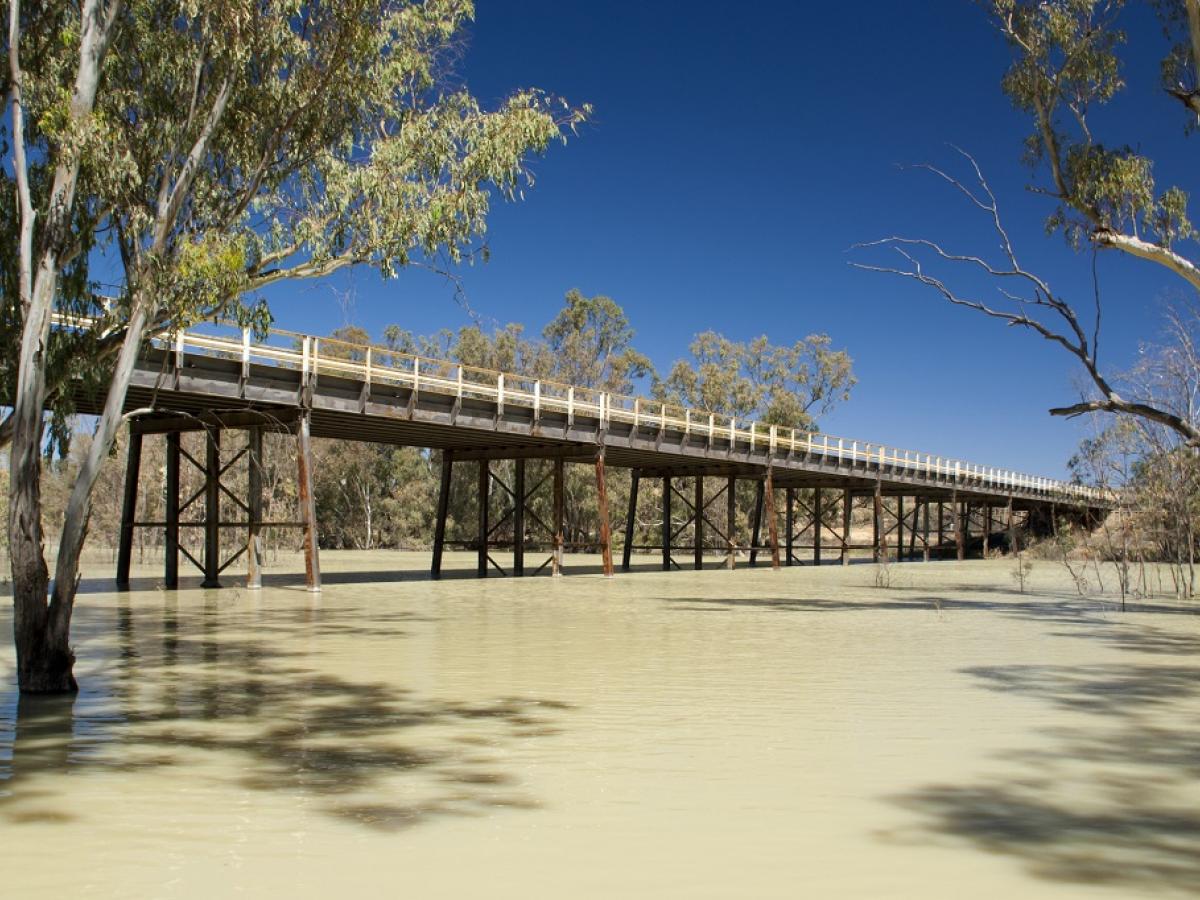New role in future of Murray-Darling Basin

The Darling River.
The University of Adelaide will play a key role in a new multi-million dollar collaborative research program set up to safeguard the environmental and commercial future of the Murray-Darling Basin.
A $50 million grant from the Federal Government’s Cooperative Research Centre Program and another $106.5 million from 85 partners will fund the newly announced One Basin Cooperative Research Centre (CRC).
The national multi-partner body will create and assess new sustainable water and agricultural solutions and drive adoption by water managers and farmers to both increase agricultural output and improve environmental outcomes. One of its regional hubs will be at Loxton in South Australia.
The national consortium also includes: the University of Melbourne; the Goyder Institute for Water Research and its affiliates; the Australian National University; Charles Sturt University; Hort Innovation; the Murray-Darling Basin Authority; Sensand Technologies and the University of Sydney - and aims to “develop and commercialise opportunities for Australia’s irrigated agriculture and rural water industries to be more productive, resilient and sustainable”.
Interim CEO Professor Mike Stewardson said the One Basin CRC would pave the way to transform irrigation regions across Australia and internationally through innovation of water, agriculture and energy technology, enhanced forecasting and decision-making capacity and pathways to adoption and commercialisation.
“Australia’s irrigation regions are the powerhouse of Australia’s agricultural sector producing 50 per cent of Australia’s agricultural profits, with the Murray-Darling Basin being the focus of two thirds of that irrigated agriculture,” Professor Stewardson said.
It’s predicted that the measures could generate significant economic benefit.
“I’m incredibly excited by this once-in-a-generation opportunity to build genuine partnerships between local communities, First Nations groups, governments, industry and research organisations, and collectively shape a more resilient and productive future for the Basin."Professor Seth Westra
The University of Adelaide’s Professor Seth Westra, a lead researcher with the new body, said the group would “bring welcome benefits not only to South Australia but the entire Murray-Darling basin”. He will head up the Technology and Opportunities program: one of the three programs of the CRC.
“I’m incredibly excited by this once-in-a-generation opportunity to build genuine partnerships between local communities, First Nations groups, governments, industry and research organisations, and collectively shape a more resilient and productive future for the Basin,” he said.
Regionally based research and development will support innovation and adaptation by farmers and communities, resulting in more resilient farms and diversified income streams. Regions will benefit from job growth and socio-economic improvements.
Over its 10-year term, One Basin CRC’s activities will be concentrated across four regional basin hubs located at Loxton and Mildura, Griffith in south-western NSW and Goondiwindi in southern Queensland.
The Lower Basin Hub based at the Loxton Research Centre in South Australia, for example, will be critical for identifying and realising future opportunities for the Basin.
Loxton Hub interim leader Kym Walton said: “The Lower Basin Hub will build on existing collaborations in the region to work on local priorities that inform outcomes for the entire basin.
“The hubs will be the focal point for place-based research and the demonstration of new technologies and education and training activities, all of which will provide the knowledge and skills to support the prosperity of local communities into the future.”
One Basin chair-elect Dr Wendy Craik AM said First Nations participation would be an important part of the new body’s focus.
“Involvement, recognition and respect of First Nations peoples is a core element. With First Nations board members, two full-time convenors, and participation through regional hubs and research projects the partnership will transform First Nations involvement in water management,” she said.
Regional basin hubs will host 75 per cent of the CRC’s activities, working directly with industry, businesses, First Nations, community and government (local, state and federal). The Loxton hub will include a consortium of local industries and partners and collaborators of the Goyder Institute, including the University of Adelaide, Flinders University, the South Australian Research and Development Institute, the CSIRO, the Department for Environment and Water and the Department of Primary Industries and Regions (PIRSA).
Director of the Goyder Institute, Dr Kane Aldridge said: “The new body will be critical for shaping the basin’s future and key to that success would be the unprecedented partnership of governments, industries and leading researchers from across the basin, which will allow the co-development of innovative and practical solutions for regional communities.”
Media contacts:
Dr Kane Aldridge, Director the Goyder Institute. Mobile: +61 (0)458 976 999, Email: director@goyderinstitute.org
Professor Seth Westra, School of Environmental and Mining Engineering, University of Adelaide, Mobile: +61 (0)414 997 406, Email: seth.westra@adelaide.edu.au
Crispin Savage, Acting Manager, News and Media, The University of Adelaide. Mobile: +61 (0)481 912 465, Email: crispin.savage@adelaide.edu.au
